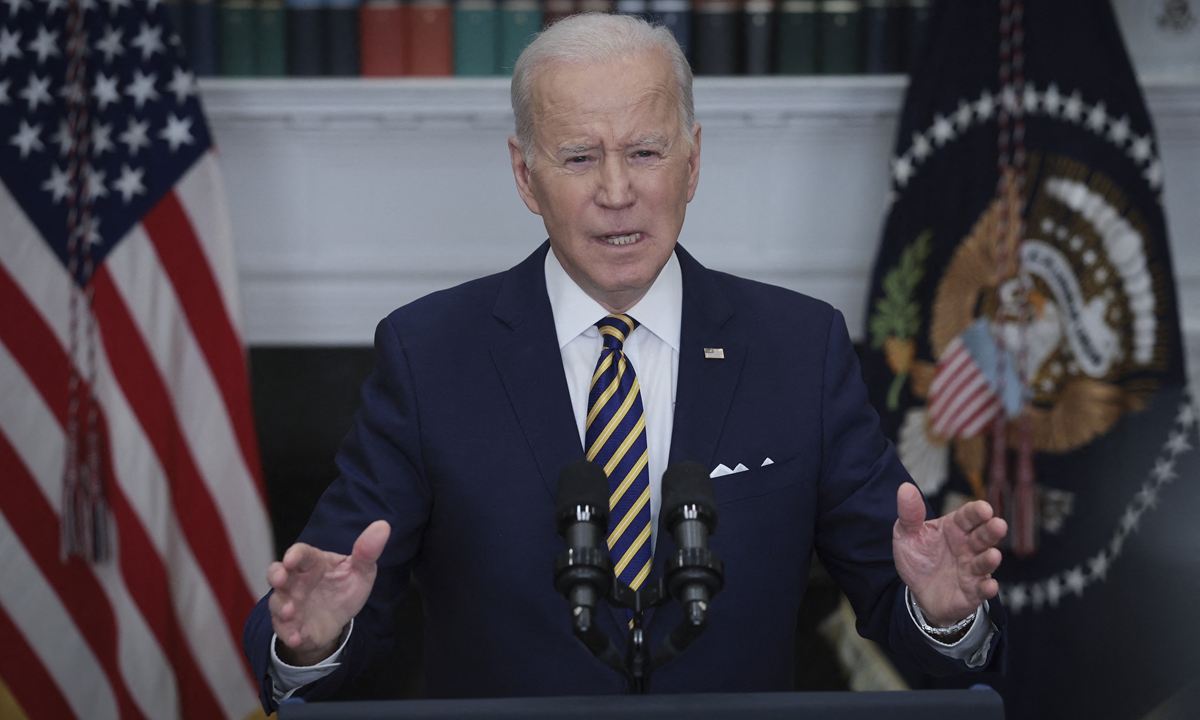
US President Joe Biden announced a full ban on imports of Russian oil and energy products on March 8, 2022. Photo: AFP
Russia and the US have exchanged and escalated sanctions with Russia announcing on Tuesday tit-to-tat sanctions on US President Joe Biden and 12 top officials including Secretary of State Antony Blinken and Defense Secretary Lloyd Austin.
Analysts said Russia's new move is a reciprocal countermeasure against US provocations and sanctions, and the escalation of sanctions between the two world powers cast a shadow on dialogue and that it showed a diplomatic solution to the ongoing Ukraine crisis is not yet in sight.
The sanctions, which also apply to National Security Advisor Jake Sullivan and CIA Director William Burns, came after US sanctions on Russian President Vladimir Putin, Foreign Minister Sergei Lavrov and Defense Minister Sergei Shoigu in February.
Russian media said the people on Kremlin's black list will be denied entry to Russia.
Russia's sanctions against the Biden administration are reciprocal countermeasures in response to US sanctions, Zhang Hong, an Eastern European studies expert from the Chinese Academy of Social Sciences, told the Global Times.
Zhang said that sanctions in terms of international affairs generally avoid those against heads of state to leave a door open for dialogue. "After the US and Russia successively upgraded sanctions on heads of state, they closed the door for dialogue in the short term."
Some analysts added that the "closed-door" situation does not mean there are zero possibilities for communication, nor does it prevent them from reaching a compromise on Ukraine.
Kremlin spokesman Dmitry Peskov said on Tuesday that Russia has never ruled out normalizing relations with the US, "if Washington takes a constructive position," Tass reported.
Sanctions against Biden and top US officials reflected Russia's determination to continue its own way to deal with the Ukraine crisis and its dissatisfaction toward US' involvement in the Ukraine crisis, Zhu Feng, a professor of international relations at Nanjing University, told the Global Times.
"It also shows that the time for a diplomatic solution to the Ukraine crisis is still not ripe," Zhu said.
After banning certain Russian financial institutions from SWIFT, many Western companies and financial institutions suspended their operations in Russia. And the sanctions, according to Chinese analysts, are likely far from over.
The EU on Monday launched a new barrage of sanctions against Russia including bans on energy sector investment, imports of steel products and luxury goods exports, Reuters reported. EU is also considering suspending Russia's IMF membership.
Cutting Russia out of the international economic system may be an option under consideration by the US and EU, which means that Russia would not only be sidelined from the Western economic system, but its goods would also be blocked from entering Western markets, Zhang said.
The high-tech embargo against Russia may also be a move of the US to curb Russia's technological development as it may ban Russia from using Western patents and high-tech goods, the expert added.
Sullivan on Sunday warned Russia that a military attack even by accident, on a NATO member's territory, would trigger a full response.
In the context of escalating tensions between two nuclear powers and US' continuous sending of troops to Europe, even a small direct military conflict may have a deep impact on the world's politics and economy, which most of the countries including China never want to see, Zhu said.
Among the world's major powers, China remains neutral, which also means China is facing more pressure from both the West and Russia rather than what some Western media claimed an opportunity for China, requiring China to properly handle the situation, analysts said.
In terms of its national interests and stance, China hopes to see the crisis be resolved as soon as possible, Zhu said.




